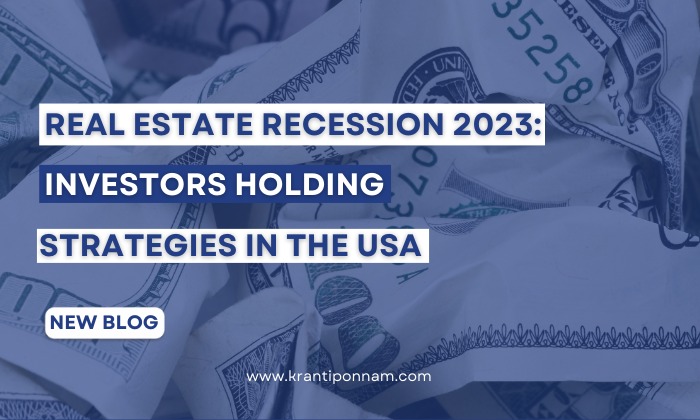The year 2023 is expected to be challenging for the real estate industry, as high-interest rates and a global recession will affect the demand, supply, and value of properties. However, this does not mean that real estate investors should give up or sell their assets at a loss. Instead, they should adopt smart strategies to protect their portfolio, generate income, and take advantage of opportunities that may arise during a downturn.
In this blog, we will discuss some of the best real estate holding strategies for surviving the recession in 2023. We will also share some tips on how to find recession-proof markets and properties that can offer stable returns and appreciation.
Buy and Hold
One of the most common and straightforward strategies for real estate investing is buy and hold. This involves buying a property and holding it for an extended period of time, usually five years or more, and renting it out to generate cash flow.
The benefits of this strategy are that it can provide passive income, tax advantages, equity appreciation, and inflation hedge. The drawbacks are that it requires capital, maintenance, management, and legal responsibilities.
To succeed with this strategy, investors should look for properties that have positive cash flow, low vacancy rates, stable tenants, and potential for appreciation. They should also diversify their portfolio across different markets, property types, and tenant profiles.
BRRR
BRRR is an acronym for Buy, Rehab, Rent, and Refinance. It is a strategy that involves buying a property that needs some repairs or improvements, fixing it up, renting it out, and then refinancing it to pull out some equity.
The benefits of this strategy are that it can increase the value and cash flow of the property, lower the interest rate and monthly payments, and recycle the capital for other investments. The drawbacks are that it requires more time, money, and skills than buy and hold, and it depends on the availability and terms of financing.
To succeed with this strategy, investors should look for properties that have high ARV (after-repair value), low rehab costs, high rental demand, and favourable refinance options.
House Hacking
House hacking is a strategy that involves buying a property with multiple units or rooms, living in one of them, and renting out the rest to cover the mortgage and expenses.
The benefits of this strategy are that it can reduce or eliminate the housing costs for the owner-occupant, provide some income from the tenants, and qualify for a lower down payment and interest rate than investment properties. The drawbacks are that it requires sharing the space and amenities with strangers, dealing with tenant issues, and sacrificing some privacy and comfort.
To succeed with this strategy, investors should look for properties that have enough space and amenities for themselves and their tenants, are located in desirable areas with high rental demand and comply with zoning and legal regulations.
Finding recession-proof markets and properties can be a challenging task, especially in times of economic uncertainty and volatility. However, there are some tips that can help you identify the best opportunities for stable returns and appreciation. Here are some of them:
- Look for markets with solid fundamentals, such as population growth, job creation, income levels, infrastructure development, and quality of life. These factors can indicate the long-term demand and supply of properties in a market and the resilience to external shocks. For example, according to Investopedia1, some of the most recession-proof cities in the US are Austin, Dallas, Denver, Nashville, and Raleigh.
- Look for properties that have low vacancy rates, high rental yields, and positive cash flow. These indicators can show the profitability and sustainability of a property, as well as the ability to cover expenses and debt services. For example, according to Toptal2, some of the most recession-proof property types are multifamily housing, self-storage units, senior living facilities, and medical offices.
- Look for properties with value-add potential, such as cosmetic upgrades, functional improvements, or operational efficiencies. These enhancements can increase the value and cash flow of a property, as well as attract more tenants and buyers. For example, according to Property Buyer3, some value-add strategies for recession-proof properties are renovating kitchens and bathrooms, adding extra bedrooms or bathrooms, installing solar panels or smart devices, and reducing maintenance costs or energy bills.
Conclusion
The recession in 2023 will pose some challenges for the real estate industry, but it will also create some opportunities for savvy investors who can adapt to the changing market conditions. By using some of the strategies discussed in this blog, such as buy and hold, BRRR, house hacking, and fix and flip, investors can survive the recession and grow their wealth in the long run.
If you are interested in learning more about these strategies or finding the best properties for your goals and investments, connect with Kranti Ponnam. He is an experienced real estate professional who can help you navigate the market and achieve your desired results.




